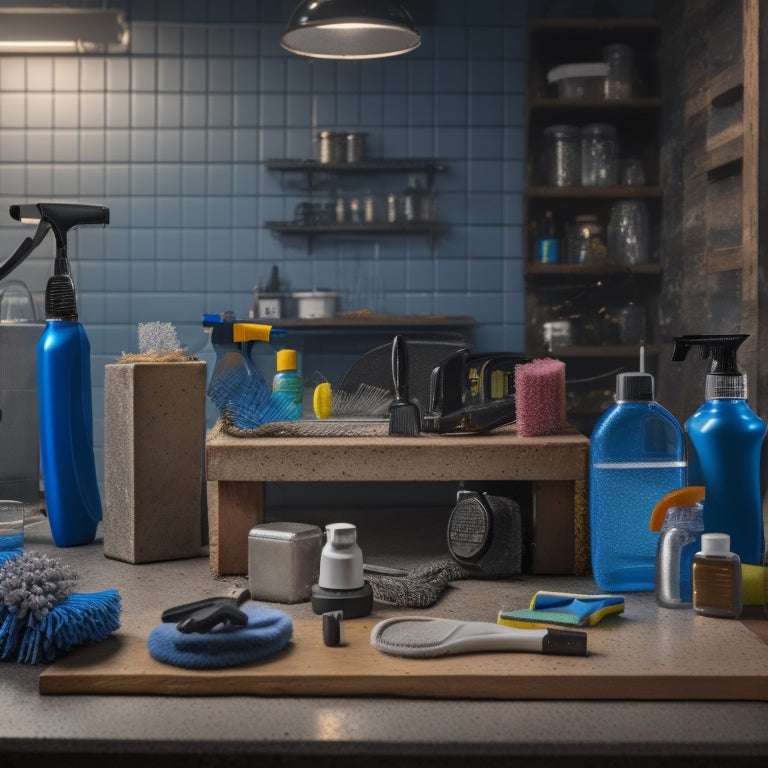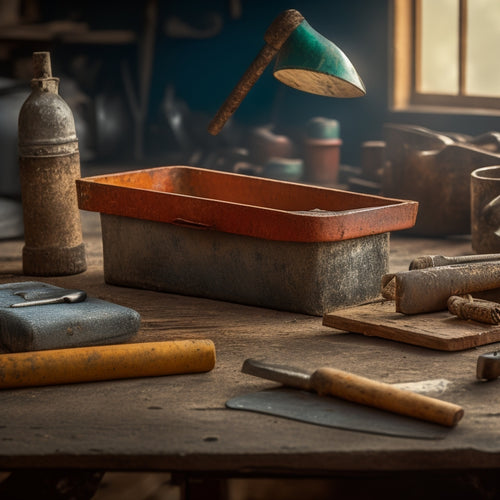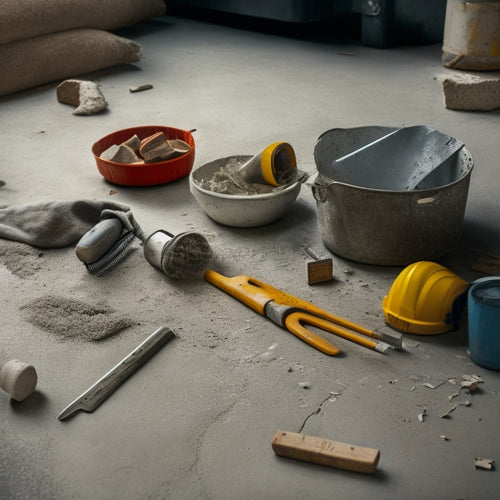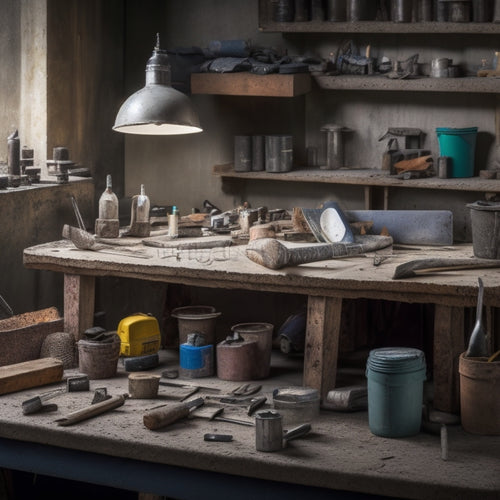
10 Best Tools for Cleaning Concrete Blocks
Share
You'll need the right tools to effectively clean your concrete blocks and restore their original appearance. For heavy debris, consider a pressure washer or a garden hose with a spray nozzle. Manual cleaning tools like wire brushes, scrub brushes, and brooms are ideal for tougher stains and loose debris removal. Chemical cleaners can tackle oily residue, while steam cleaners and microfiber cloths are best for delicate surfaces and finishing touches. For thick grime, a rotary hammer may be necessary. With these essential tools in your arsenal, you'll be well-equipped to tackle even the toughest cleaning tasks - and discover even more effective techniques to achieve a pristine finish.
Key Takeaways
• High-pressure cleaning tools like pressure washers and garden hoses with spray nozzles are effective for removing heavy debris and dirt from concrete blocks.
• Manual cleaning tools such as wire brushes, scrub brushes, and brooms are ideal for tackling tough stains, gentle cleaning, and loose debris removal respectively.
• Chemical cleaning solutions like chemical cleaners for oily residue and rust removal methods are necessary for breaking down stubborn stains and preventing damage to concrete blocks.
• Advanced cleaning tools like sandblasters and rotary hammers are perfect for stripping away rust and removing thick grime and accumulated dirt from concrete blocks.
• Eco-friendly and finishing tools like steam cleaners and microfiber cloths provide a gentle and effective way to sanitize and finish concrete blocks without damaging them.
Pressure Washer for Heavy Debris
Blast away heavy debris from your concrete blocks with a pressure washer, which can deliver a powerful stream of water to dislodge dirt, grime, and stubborn stains.
When using a pressure washer, remember to prioritize safety above all. Always wear protective gear, including gloves, safety glasses, and a face mask, to shield yourself from flying debris and harsh chemicals. Make sure to maintain a safe distance from the nozzle to avoid accidents.
To get the most out of your pressure washer, invest in the right accessories. A wide fan tip is ideal for covering large areas, while a narrow nozzle is better suited for tight spaces and corners. A soap dispenser attachment can help you apply cleaning solutions evenly, and an extension wand can reach high areas without the need for ladders.
Wire Brush for Tough Stains
When you're faced with tough stains on your concrete blocks, you'll need a tool that can really get in there and scrub them away.
That's where a wire brush comes in - its stiff bristles will give you the power you need to tackle even the most stubborn stains.
Stiff Bristle Power
Using a stiff-bristled power brush, you can aggressively attack tough stains on concrete blocks, dislodging dirt and grime with ease. This tool is a game-changer for tackling stubborn stains that refuse to budge with regular cleaning methods. The stiff bristle durability guarantees that the brush can withstand the rigors of intense scrubbing, making it an ideal choice for heavy-duty cleaning.
One of the key benefits of a stiff-bristled power brush is its versatility. You can use it to clean a variety of concrete block surfaces, from rough-textured walls to smooth floors. The brush's stiff bristles can get into tight spaces and crevices, removing dirt and debris with ease.
Plus, the power behind the brush makes quick work of even the toughest stains. With a stiff-bristled power brush, you'll be able to tackle even the most challenging cleaning tasks with confidence. Whether you're a DIY enthusiast or a professional contractor, this tool is a must-have for anyone looking to get the job done efficiently and effectively.
Rust Removal Method
You'll need a more aggressive approach to tackle rust stains, which is where a wire brush comes in. Its coarse wires are capable of scraping away stubborn rust deposits that a stiff-bristled power brush can't touch. This tool is perfect for removing heavy rust buildup, and its effectiveness lies in its ability to physically scrape off the rust.
When using a wire brush, be sure to wear protective gear, including gloves and safety glasses, as the wires can be sharp and the rust particles can be hazardous.
After removing the rust, consider applying rust prevention techniques to prevent future stains. A surface treatment option like a rust-inhibiting coating or a sealant can help protect the concrete blocks from further damage.
Additionally, regular cleaning and maintenance can go a long way in preventing rust stains from forming in the first place. By combining the right tools, like a wire brush, with effective surface treatment options, you'll be able to keep your concrete blocks looking their best and extend their lifespan.
Chemical Cleaner for Oily Residue
To tackle oily residue on concrete blocks, turn to a chemical cleaner specifically designed to break down and emulsify stubborn oil-based stains.
You'll want a product that can effectively dissolve and lift the residue, leaving your concrete blocks looking like new. Look for chemical cleaners that utilize biodegradable solvents, which are safer for the environment and won't harm your skin. Industrial degreasers are also effective, but be sure to follow the instructions carefully and take necessary safety precautions.
When choosing a chemical cleaner, consider the type of oil-based stain you're dealing with. Different products are designed to tackle specific types of stains, such as motor oil, grease, or tar.
Read the label carefully and choose a product that's specifically designed to tackle your type of stain. Always follow the instructions on the label, and be sure to test the product on a small, inconspicuous area first to verify it won't damage your concrete blocks.
With the right chemical cleaner, you'll be able to easily remove oily residue and restore your concrete blocks to their original condition.
Broom for Loose Debris Removal
Before tackling stubborn stains, sweep away loose debris with a sturdy broom, clearing the way for more targeted cleaning methods to penetrate deeper into the concrete.
You'll want a broom that's up to the task, so consider investing in a heavy-duty broom with stiff bristles. This will help you effectively manage debris and prevent scratching the concrete surface.
When choosing a broom, you have two main options: a push broom or an angle broom. A push broom is ideal for larger areas, while an angle broom is better suited for corners and tight spaces.
Regardless of which type you choose, make certain to sweep in sections, working from one end of the area to the other. This will help you keep track of where you've been and guarantee a thorough cleaning.
Garden Hose With Spray Nozzle
When you're cleaning concrete blocks, a garden hose with a spray nozzle is a must-have tool.
You'll appreciate the flexibility it offers with different spray pattern options, allowing you to target specific areas or cover larger surfaces.
As you work, you'll also value the ability to control water pressure, which helps prevent damage to the blocks or surrounding areas.
Spray Pattern Options
You'll find that adjusting the spray pattern of your garden hose with a spray nozzle allows for more targeted and efficient cleaning of concrete blocks. By changing the spray pattern, you can direct the water flow exactly where you need it, reducing waste and increasing cleaning power.
There are several spray nozzle types to choose from, each with its own strengths. Fan nozzles are great for wide areas, while pencil nozzles are better suited for tight spaces. You may also consider adjustable nozzles that allow you to change the spray angle and pattern on the fly. This flexibility is particularly useful when cleaning concrete blocks with varying shapes and sizes.
Make the most of your spray nozzle by experimenting with different spray angle adjustments. A wide spray angle is ideal for covering large surfaces, while a narrower angle is better for precision cleaning. By adjusting the spray angle, you can guarantee the water hits the concrete blocks at the right spot, every time.
With the right spray pattern and angle, you'll be able to tackle even the toughest concrete block cleaning jobs with ease.
Water Pressure Control
Frequently, adjusting the water pressure of your garden hose with a spray nozzle becomes crucial for effectively cleaning concrete blocks. You'll want to achieve ideal settings to tackle tough dirt and grime without damaging the blocks.
To do this, start by adjusting the nozzle to the correct spray pattern for your cleaning task. Next, focus on controlling the water pressure. Too little pressure may not remove dirt effectively, while too much pressure can damage the blocks or dislodge mortar.
You can adjust the water pressure by turning the faucet or using a pressure regulator. It's important to monitor the pressure gauge to verify you're within the recommended range. Typically, a pressure range of 1000-1500 PSI is suitable for cleaning concrete blocks.
By adjusting the water pressure, you'll be able to tackle even the toughest cleaning tasks with ease. Remember to test the pressure on a small, inconspicuous area first to verify you're not damaging the blocks.
With the right water pressure control, you'll be able to clean your concrete blocks efficiently and effectively.
Sandblaster for Rusty Blocks
To tackle concrete blocks corroded by rust, grab a sandblaster, which will effectively strip away the rust and restore the surface to its original condition. This powerful tool is a game-changer when it comes to removing stubborn rust and corrosion. However, before you start blasting away, make certain you're taking the necessary precautions.
Here are some essential sandblaster safety tips to keep in mind:
-
Always wear protective gear, including gloves, safety glasses, and a dust mask
-
Verify the area is well-ventilated to avoid inhaling dust and debris
-
Keep the sandblaster moving to avoid damaging the concrete surface
- Never point the sandblaster at people or animals
In addition to safety tips, it's also vital to maintain your sandblaster regularly to guarantee peak performance. Regular maintenance techniques include cleaning the nozzle and hose, checking for air leaks, and storing the sandblaster in a dry place.
Scrub Brush for Gentle Cleaning
When tackling concrete blocks that need a gentle cleaning, you'll want to reach for a scrub brush specifically designed for the task.
This type of brush is equipped with soft bristles that effectively remove debris without scratching or damaging the surface.
Soft Bristle Design
You'll want to reach for a soft bristle scrub brush when tackling delicate concrete block surfaces that require gentle cleaning. This type of brush is designed to effectively remove dirt and grime without scratching or damaging the surface.
Soft bristle benefits include being gentle on surfaces, reducing the risk of scratches, and being easy to clean.
Soft bristle materials are typically made from nylon or polyester, which are durable and resistant to wear and tear. These materials also provide a gentle touch on surfaces, making them ideal for cleaning sensitive areas.
When choosing a soft bristle scrub brush, consider the following:
-
Look for bristles with a soft, flexible texture
-
Opt for a brush with a compact head to reach tight spaces
-
Choose a brush with a comfortable, ergonomic handle for easy grip
- Consider a brush with adjustable bristle stiffness for customized cleaning
Effective Debris Removal
For effective debris removal, turn to a scrub brush specifically designed for gentle cleaning, which excels at dislodging dirt and grime without damaging the concrete block surface.
As you tackle your cleaning project, you'll appreciate the brush's ability to sweep away loose debris, making way for more thorough surface preparation.
When it comes to debris collection, this brush is a valuable asset, allowing you to easily gather and dispose of dirt, dust, and other unwanted particles.
Gentle on Surfaces
Using a scrub brush designed for gentle cleaning, you tackle tough dirt and grime without scratching or damaging the concrete block surface. This is especially important when working with sensitive or decorative blocks that require surface protection.
A gentle scrub brush is also an eco-friendly solution, as it eliminates the need for harsh chemicals or abrasive cleaners that can harm the environment.
When choosing a scrub brush for gentle cleaning, look for the following features:
-
Soft-bristled or nylon bristles that won't scratch the surface
-
An ergonomic handle that provides comfortable grip and control
-
A compact head that can reach into tight spaces and corners
- A durable construction that can withstand repeated use and cleaning
Steam Cleaner for Delicate Blocks
When working with delicate concrete blocks, a steam cleaner is often the best tool to remove dirt and grime without damaging the surface. You'll appreciate the gentle yet effective cleaning power of steam cleaning, which is particularly useful for blocks with intricate designs or textured finishes. Steam cleaning benefits include the ability to sanitize and degrease surfaces without using harsh chemicals, making it an eco-friendly option.
Here are some key advantages of using a steam cleaner for delicate concrete blocks:
| Advantage | Description |
|---|---|
| Gentle on surfaces | Steam cleaning won't scratch or etch delicate concrete blocks |
| Efficient cleaning | Steam can penetrate deep into pores to lift dirt and grime |
| Chemical-free | Steam cleaning is an eco-friendly alternative to harsh chemicals |
| Versatile | Steam cleaners can be used for a variety of surfaces, including concrete, stone, and more |
Rotary Hammer for Thick Grime
You'll need a more aggressive approach to tackle thick grime that's accumulated on concrete blocks, which is where a rotary hammer comes in. This powerful tool is designed to break down and remove stubborn grime, dirt, and stains that have built up over time.
When using a rotary hammer, it's important to employ the right techniques to avoid damaging the concrete blocks. Here are some key considerations to keep in mind:
-
Always wear protective gear, including gloves, safety glasses, and a dust mask.
-
Use a chisel bit or pointed bit to scrape away grime and debris.
-
Apply gentle to moderate pressure, depending on the level of grime buildup.
- Work in small sections to maintain control and avoid creating scratches or marks.
In addition to using the right techniques, it's vital to prioritize surface protection. Make sure to clean the area thoroughly after using the rotary hammer to prevent dirt and debris from getting ground into the concrete.
Microfiber Cloth for Finishing Touch
A microfiber cloth is your go-to tool for adding a finishing touch to your newly cleaned concrete blocks, leaving them with a streak-free shine. This versatile cloth is a must-have in your cleaning arsenal, offering numerous benefits that make it an essential tool for achieving professional-looking results.
| Microfiber Cloth Benefits | Finishing Touch Techniques |
|---|---|
| Absorbs dirt and grime easily | Wipe down concrete blocks in a circular motion |
| Lint-free and streak-free | Use a gentle touch to avoid scratching the surface |
| Machine washable and reusable | Dry the cloth frequently to prevent streaks |
| Effective with or without cleaning products | Use a clean section of the cloth for each block |
| Leaves a smooth, even finish | Inspect the block from different angles for a flawless finish |
Frequently Asked Questions
Can I Use a Regular Brush Instead of a Wire Brush?
You're wondering if a regular brush can substitute a wire brush for cleaning concrete blocks.
While a regular brush might seem like a gentler option, it's not the most effective choice. The bristles won't be able to penetrate deep into the block's pores, leaving dirt and grime behind.
For a thorough clean, you need a wire brush that can aggressively scrub and dislodge debris.
Stick with a wire brush for ideal brush effectiveness and cleaning techniques that get the job done.
How Often Should I Clean My Concrete Blocks?
You've probably wondered if you're cleaning your concrete blocks too much or too little.
The truth is, it depends on the environment they're in. If they're exposed to heavy foot traffic or harsh weather, you'll need to clean them every 1-2 months.
Otherwise, a maintenance schedule of every 3-4 months should suffice.
Set a reminder to keep your blocks looking their best and prevent dirt buildup.
Are Chemical Cleaners Safe for Colored Concrete Blocks?
When it comes to cleaning your colored concrete blocks, you're right to wonder if chemical cleaners are safe to use.
The truth is, many chemical cleaners can damage or discolor your blocks, especially if they're not specifically designed for colored concrete.
Before using any chemical cleaner, make certain it's labeled as safe for colored concrete and follow the instructions carefully.
It's also a good idea to test a small, inconspicuous area first to guarantee the cleaner won't affect the color or integrity of your blocks.
Can I Use a Steam Cleaner on Newly Laid Concrete Blocks?
You're wondering if you can use a steam cleaner on newly laid concrete blocks. The answer is yes, but with caution.
Steam cleaning benefits include effective dirt removal and sanitizing. However, you'll want to guarantee the ideal cleaning temperature is around 150°F to 180°F to avoid damaging the blocks.
Test a small area first to guarantee the steam doesn't etch the surface.
Do I Need to Wear Protective Gear When Cleaning Concrete Blocks?
'An ounce of prevention is worth a pound of cure.' When you're cleaning concrete blocks, don't take safety for granted.
You'll be working with harsh chemicals, abrasive materials, and potentially hazardous debris.
Always wear protective equipment, including gloves, safety glasses, and a dust mask.
Take safety precautions seriously to avoid injuries and respiratory issues.
Don't risk your health; gear up and clean with confidence.
Conclusion
You've got the right arsenal to tackle even the toughest concrete block cleaning jobs.
With these 10 tools, you'll be able to blast away heavy debris, scrub away tough stains, and wipe away oily residue like a pro.
Cleaning concrete blocks is like solving a puzzle - each tool is an essential piece that helps you achieve a sparkling clean finish.
Now, get out there and start cleaning like a master!
Related Posts
-

Smart Guide to Buying Used Concrete Hand Tools
You're about to buy used concrete hand tools, and you need to get it right. Dedicate time to identify the tools you n...
-

Top 10 Concrete Repair Tools for Small Fixes
You'll need the right tools to tackle small concrete repairs efficiently and effectively. When it comes to small fixe...
-

Top Tools for Concrete Repair Success
When it comes to concrete repair success, you'll need a well-stocked toolkit with essential hand tools like trowels, ...


